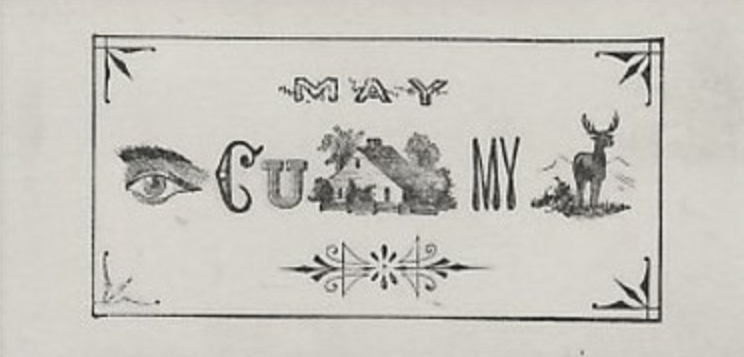I have always rather loved a rebus - those almost code-like messages where pictures represent words, and, if you say the word, it turns out to be a homophone for something else entirely. For instance this, a Victorian card probably given out a dance, and asking (just very slightly creepily) ‘May I see you home, my dear?’ - or perhaps it’s just my mind that hears this spoken in a low, slightly oily voice, by a man twirling his waxed moustaches…
Apparently rebuses (and yes, that is the correct plural, it seems) really came into their own in heraldry in the Middle Ages, when Garter King of Arms and similarly magnificently named gentlemen were busily employed designing blazons (don’t you love the terminology?) for newly-created aristocrats. For instance, the late Queen Mother, Elizabeth Bowes-Lyon, had as her family’s coat of arms representations of lions and - wait for it - bows. Really stretched themselves there, the good old College of Arms
I was drawn to think about rebuses and their many charms, when picking up the latest novel by Ian Rankin, featuring his complex, ageing ex-detective John Rebus. There are now twenty-six Rebus books, as well as a myriad other short stories, standalones, and plays. Sir Ian - to carry on the knightly theme (he was ennobled in the late Queen’s Jubilee Honours) - is an amazing writer, and Rebus is a brilliant character.
If you’ve not come across the books before, you’re in for a massive treat. I would recommend starting at the beginning with Knots and Crosses, in which Rebus is an eager, maybe even over-eager young Edinburgh policeman, and then carrying on until you reach Midnight and Blue, the latest and possibly the last in the series, which opens with Rebus being held in prison for murder. He is no longer young, nor even eager, but he is dogged and determined. Determined to get out of prison, and also, as events brutally unfold with the murder of a fellow-prisoner on the same corridor, determined to find out who has killed the young man and why.
It is by any measure a superb book, complex, insightful, craftily plotted and meticulously crafted. I cannot recommend it highly enough.
It is also a measure of Rankin’s genius that he chose a code-like surname for his clue-cracking detective - a name drawn from a Latin saying, and utterly appropriate for the way in which Rankin writes, showing not telling every inch of the way. What is the saying? Non verbis sed rebus - not by words but by things. It has to be said, Rankin’s words are pretty special, and they show us a multitude of things.






